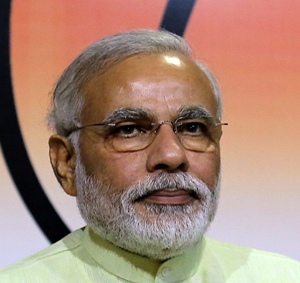Hagel to visit India to prepare for Modi's summit with Obama
 Washington, Aug 6 - The eager courtship of Prime Minister Narendra Modi by the Obama Administration continues with a third cabinet-level visitor flying to India this week to whip up a respectable agenda for the September summit.
Washington, Aug 6 - The eager courtship of Prime Minister Narendra Modi by the Obama Administration continues with a third cabinet-level visitor flying to India this week to whip up a respectable agenda for the September summit.
Defence Secretary Chuck Hagel will follow Secretary of State John Kerry and Commerce Secretary Penny Pritzker, who went in a storm of lofty rhetoric only to come back chastened with loads of "homework" and a chiding that "friends shouldn't spy on friends" about US surveillance of friendly governments.
There was more gloom when Kerry failed to change India's mind on signing the Trade Facilitation Agreement under the WTO. Predictably, a prominent right-leaning American commentator asked if "we should just forget about India," citing a laundry list of complaints.
But official Washington is making a determined effort to woo India once again and assuage hurt feelings over Modi's visa denial. The Americans understand they might be in the dock for sometime but they are confident of the "strategic and economic heft" they bring to the table.
Hagel's job is to explore and find a substantive agenda for the Obama-Modi meeting in Washington. Even though the defence partnership is in better health than the rest of the drifting, difficult relationship, it doesn't mean things are easy.
The three broad strands - weapon sales, strategic cooperation and future co-production - are all suffering from a lack of movement, delays and even fatigue.
Both sides find each other's bureaucracies difficult to navigate. Clearances, certificates, authorizations and restrictions on high technology make the US defence industry the most controlled and over-regulated industry in the country.
Delays in decision-making and suspicions about American reliability are Indian constants. Harmonization of the two mindsets is key but it requires sustained high-level attention. The fact that Arun Jaitley has dual responsibility of finance and defence ministries doesn't help.
The Americans are making efforts to streamline their processes for the Defence Technology and Trade Initiative or DTTI under which new bright and shining initiatives are to take birth. It is something Hagel will push. He named Frank Kendall to lead the US side but India is yet to appoint someone after the departure of Shiv Shankar Menon with the last government.
So far, efforts to identify weapon systems for co-production under the DTTI have not borne fruit.
India is yet to choose from the US list on offer, which includes an unmanned aerial vehicle programme and an offer to produce the next generation of the Javelin missile. The Americans call the list "ground-breaking," the Indians sniff the offers don't include the top-end technology.
India wants to strengthen its defence manufacturing capabilities but is still too suspicious to partner with the US. The hope is that Hagel will carry a few new proposals, following India lifting the FDI cap from 26% to 49% in the defence sector.
But American companies have difficulty with India's "offset policy" which requires that 30% of the payments be spent in India to upgrade the existing manufacturing base. But Indian companies' capacity to absorb is limited.
Although Pentagon announced that Hagel's trip is meant to "nurture" the defence relationship, the difficulties are all too obvious. That the last Indian government did not leave behind a clear agenda with a ticking clock on projects does not help. It appears the Indian side wants to wait and see what Hagel has in his briefcase.
The sale of American light Howitzer guns is a good example of the persistent problems. Even though the Indian army needs them badly, no decision was made while the price kept going up from the first quote of $647 million in 2010 to now more than $800 million this year.
The assembly line producing the gun shut down last year and there are new costs to restarting it. And now India says it can't afford it.
Yet, US defence manufacturers can't ignore India - it has been the biggest arms importer since 2010. India was the largest buyer of US military equipment last year with $1.9 billion worth of imports.
For both strategic and commercial reasons, the US Department of Defence is one of the strongest proponents of India. It wants India in its corner but New Delhi currently doesn't see reasons to climb down from the fence.
Hagel's will try to get a sense whether the Modi government, which has a strong mandate, will be more forthright in becoming a partner. To reassure India, he will try to explain the US pivot - the effort by the United States to put more military and naval resources in the Asia-Pacific region to counter the rise of China - and how India can play a role.
But Indian officials question the seriousness of the pivot. For the Americans to convince India that they can and will confront China-if needed-will take more than a visit and a power point presentation.
It is no secret that the US defence budget is decreasing along with the appetite for foreign entanglements. The US response to Chinese incitements against Vietnam, Japan and the Philippines over the last two years has not raised confidence levels. Some Indians think the US is "retreating" from the world.
While the talk of "retreat" may be premature, the Obama presidency has certainly raised questions in many Asian countries about American willingness to get involved in their disputes with China.
And the realists among Americans would agree that since they are hedging their bets in these uncertain times, others can do the same. Hagel might as well be prepared to face a skeptical, distracted, and questioning Indian side.
The views expressed in the above article are that of Ms. Seema Sirohi, a senior journalist based in Washington D. C. (ANI)